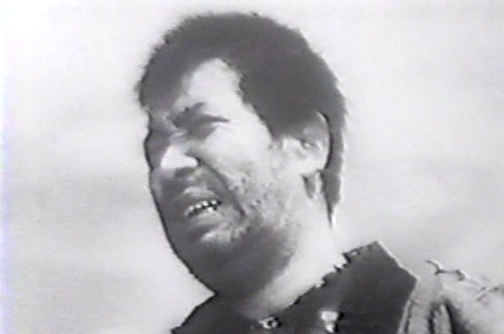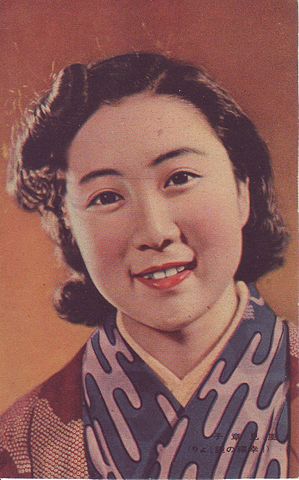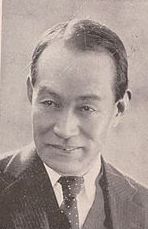Physical Address
304 North Cardinal St.
Dorchester Center, MA 02124

Other titles: Der Acker [The Field] (alternate German title); Ziemia (literal Polish title); Поле [“Pólye”: The Field] (alternate Russian title)
| Production Company | Nikkatsu Tamagawa (Chōfu) |
| Production Dates | 1937 – 1939 (precise dates unknown) |
| Scenarists | Kitamura Tsutomu, Yagi Yasutarō |
| Source | Tsuchi (土) [The Soil] by Nagatsuka Takashi (novel, 1910-1912) |
| Cinematographer | Midorikawa Michio |
| Art Director | Hori Yasuji |
| Music | Norimatsu Akihiro |
| Performers | Kosugi Isamu (Kanji, a tenant farmer); Kazami Akiko (Otsugi, Kanji’s daughter); Donguriboya (Yokichi, Kanji’s young son); Yamamoto Kaichi (Uhei [a.k.a., Ukichi], Kanji’s father-in-law); Miake Bontarō (Heizo); Suzuki San’emon (Gen-San); Fujimura Masako (Tami); Murata Chieko (Landlord’s Wife) |
| Filming Locations | Tamagawa Photo Studio (Chōfu); location shooting at Ibaraki Prefecture, Kantō region, Honshu |
| Status | About 80% extant |
| Photography | Black and white |
| Ratio | 1.37:1 |
| Format | 35 mm |
| Subtitles | Yes (German and English) |
| Original Release Date | April 13, 1939 (Teitoza Theater, Shinjuku, Tokyo) |
| Length | 142 minutes (original version, lost); 93 minutes (1968 German print w/ German subtitles); 115 minutes (2001 Russian print w/ German subtitles); 117 minutes (National Film Archive of Japan (NFAJ) composite print of German and Russian versions) |
| Awards and festivals/retro screenings | Kinema Junpo “Best One”; Venice Film Festival (nominee), 1939; New York Film Festival, 2011; MOMA retrospective (2016) |
Poverty-stricken tenant farmer Kanji, a widower, lives in a humble hut in a rural village with his two children: his teenage daughter, Otsugi, and his young son, Yokichi. Kanji’s father-in-law Ukichi (called, in the English subtitles, “Uhei”), with whom Kanji has never gotten along, and who cannot work in his native village as he is now too old and feeble, has recently moved in with Kanji’s family. This creates conflict, as Kanji resents having another mouth to feed, as well as the debts that Uhei has brought with him and for which he, Kanji, is now expected to be responsible.
Kanji asks permission of the landlord’s wife to make additional income by threshing grain, and she allows this. While he is working at this job, Otsugi arrives to inform her father that Uhei is threatening to leave and return to his native village, even though he’s too old to work. The landlord’s wife, hearing this, offers to pay Kanji for the full day’s work if he would stop and go talk to the old man, but Kanji refuses to stop working, unwilling to dissuade the old man from going.
Kanji steals grain from a local peasant’s field and the peasant complains to a policeman who has come to investigate. Kanji runs away and hides in a barn, with the full knowledge of the landlord’s wife. Without saying so explicitly, she advises Otsugi to cut some grain from her family’s fields (which the girl then tosses into the river), in order to convince the police that the stolen grain found on Kanji’s property is really from Kanji’s own land. When the mollified policeman leaves, Kanji comes out of hiding.
While digging with her father at a nearby beach in search of driftwood to use as firewood, Otsugi sees several of her girlfriends going off in a ferry boat to work at a nearby weaving mill. She feels lonely watching them go. Kanji tells his daughter that she must join them eventually, even if it means abandoning him to dire poverty, but Otsugi refuses to do this.
Kanji and Otsugi are shown working in a field collectively with the other villagers, enduring thinly-veiled taunts from the others about the unusually close relationship between them. Later, during a drought, they are shown transporting buckets of water over long distances to keep their own crops alive.
One morning, before she and Kanji go off to work in the fields, Otsugi, without her father’s permission, gives Yokichi some eggs to eat. After she leaves, the boy cooks the eggs and shares them with his grandfather. He tells Uhei that his father often says that the family’s supply of rice is being consumed much faster since the old man has come to live with them, and Uhei grows silent and sad.
Kanji and his daughter fill large bags with the rice they’ve harvested to give to the landlord’s wife, who congratulates them for being the most productive among all the tenant farmers. As a reward, she treats Kanji and his family to a meal with saké. Kanji returns home drunk, but happy.
The village celebrates a wedding at night. Kanji, who refuses to go to the celebration, sends the boy Yokichi to bring Otsugi home, because he’s afraid the local boys will try to seduce her. The girl is busy helping the village women cook the wedding feast at a farmhouse, and when the boy arrives to fetch her, she uncharacteristically defies her father’s order. The boy then listens to the men speak disparagingly about Kanji and his suspect relations with his daughter.
The bride arrives, riding a horse sidesaddle, to the chanting of an unseen singer, and walks inside the farmhouse with the wedding party. Heizo finds Uhei and invites him to the temple. While there, the villagers get the old man drunk and they all complain about Kanji.
Otsugi meets Kanji on her way home. Her father scolds her, but she tells him it would have been better if he’d come himself to take her home, rather than sending the little boy. When Uhei finally comes home drunk, he berates both Kanji and Otsugi. The girl nevertheless brings her grandfather to his hut and massages his feet, then returns to the main house with her father.
Uhei wakes up in his hut the next morning after Kanji and Otsugi have already gone out to the fields. He goes to the main house and meets Yokichi, who has stolen some chestnuts. The boy suggests that they roast them on a fire. He tries to light a match, but seems unable to do so, and throws the match into the underbrush nearby. Uhei succeeds in lighting the fire under the chestnuts. A large blaze suddenly appears in the brush where Yokichi had thrown the match, and Uhei unsuccessfully tries to put it out. The fire soon engulfs the whole house. The old man and the boy, both badly burned, escape into the fields.
Kanji sees the villagers running towards the fire and follows them, crying out in anguish at the sight of his house in flames. The villagers abandon Kanji’s house as lost and try to rescue the landlord’s house from the spreading conflagration. Otsugi prevents her horrified father from running into the roaring blaze to his death, and searches for her missing brother and grandfather. Kanji falls to the ground in despair.
Sometime later, Otsugi and Yokichi visit Uhei at the temple where he is now temporarily living. The girl tells her grandfather that they have built a new house from the ruins of the old one. She has brought the old man rice without Kanji’s knowledge.
Otsugi leaves and Heizo arrives. Yokichi tells Heizo that Kanji is angry whenever his daughter visits the old man. Heizo informs the boy that the whole village is angry at Kanji for the way he has treated Uhei.
A delegation of the village men, including Heizo, confronts Kanji to shame him into changing his ways, even offering to care for Kanji’s destitute family if he takes Uhei back. Kanji, embittered by his lifetime of poverty and hunger, blames his father-in-law for all his troubles, and refuses their offer. The men tell Kanji that they will go to the landlord to demand that he be expelled from the village.
In the rebuilt house, Kanji suggests to Otsugi that she go to the weaving mill to work as her friends had done, but she won’t leave because of grandfather. She reminds her father that “the field didn’t burn” and Kanji finally seems to come to his senses.
Heizo arrives at Kanji’s house to tell them that Uhei has run away from the temple. The village mobilizes to search for the old man. After Kanji leaves to join the search, Uhei appears near the house, unseen, carrying a rope.
Heizo, who assumes the old man is dead, recognizes Kanji among the search party and begins to beat him, accusing him of being responsible for Uhei’s fate. Meanwhile, Uhei tries to hang himself from a tree near the house, but the bough breaks under his weight. Otsugi finds her unconscious grandfather and drags him inside.
Desperate, she pulls Yokichi out of bed and sends him out to look for his father. Kanji on his way home meets Yokichi, and they return to the house. Otsugi is convinced that her grandfather is dead, but Kanji, finding signs of life in him, tells Yokichi to rub his feet while Otsugi tends the fire.
(The extant film breaks off at this point because the final reel is missing. In a title card, it is revealed that, based on the surviving script, Uhei survived and recovered and that life went on in the village much as before.)

Kazami Akiko made her film debut with this movie; she was only about 15 or 16 years old when cast, though she had previously acted onstage. This was to be the beginning of a very, very long career in films and television, one of the longest of any actor: 76 years, mostly in supporting or walk-on parts. During the postwar period, she appeared in five Uchida films in minor roles: the suspense thriller The Eleventh Hour (1957), as the wife of a trapped coal miner; the period film The Thief Is Shogun’s Kin (Senryo-jishi, 1958); The Outsiders (Mori to mizuumi no matsuri, 1958), in which she played the wife of Mikuni Rentarō’s character; the first installment of the five-part Miyamoto Musashi series (1961), as Musashi’s sister; and A Fugitive from the Past (Kiga kaikyo, 1965), again as the wife of Mikuni Rentarō’s character. She gave her final performance, while in her nineties, in 2013. She died in 2016, age 95.

Yamamoto Kaichi – The following brief bio of the actor who plays Uhei [a.k.a., Ukichi], Kanji’s formidable father-in-law, appears on the Internet Movie Database (IMDb):
Born in Tokyo in 1876, Kaichi Yamamoto was one of the early actors with Nikkatsu who stayed with and grew with the company for over 20 years. He toured the USA with the Kawakami Otojiro Group as one of their managers, but in 1917 he was invited to join Nikkatsu, which at that time was aiming to develop the modern Japanese film industry. While with the latter company, he starred in rough character roles in films such as Kirin Chigiri, Ikiru Shikabane, Fukkatsu and Konjikiyasha. He was skilled at “becoming” the characters he played in his films, so that his name became synonymous with them, one of the most famous being that of the title role in Mitokomon. It is said that there is [sic] none other who could act the parts of historical characters as well as him [sic]. In the film Tsuchi, under director Tomu Uchida, he played the role of the farmer Kanji’s father [sic], Uhei, brilliantly, but it was to be his last film [sic].1 Yamamoto was also famous for his development of make-up in the film industry and he produced and sold “Yamaka” powder. He died in 1939.
Note: According to IMDb, Yamamoto appeared in seven other films for Uchida besides this one, all lost, including the “Best Ten” winner The Naked Town (Hadaka no Machi, 1937).
Trivia note: The Teitoza, the movie theater in Tokyo’s Shinjuku district at which this film premiered in April, 1939, would become, eight years later, in the postwar era, the venue for Japan’s first strip club.
(Continued on Page 2)
[…] adaptation of Nagatsuka Takashi’s novel The Soil, though he wasn’t cast in Uchida’s 1939 film version. After making his movie debut in 1936, he amassed over 250 film and TV credits over six decades. […]
[…] Uchida's Earth (土), his 1939 masterpiece Aug 2, 2021 / 12:21 pm Reply […]
[…] literary adaptation and the first of two Uchida films in three years (the second one was Earth (Tsuchi)) to top the KJ poll. The ultimate origin of this work was a published story by, of all […]